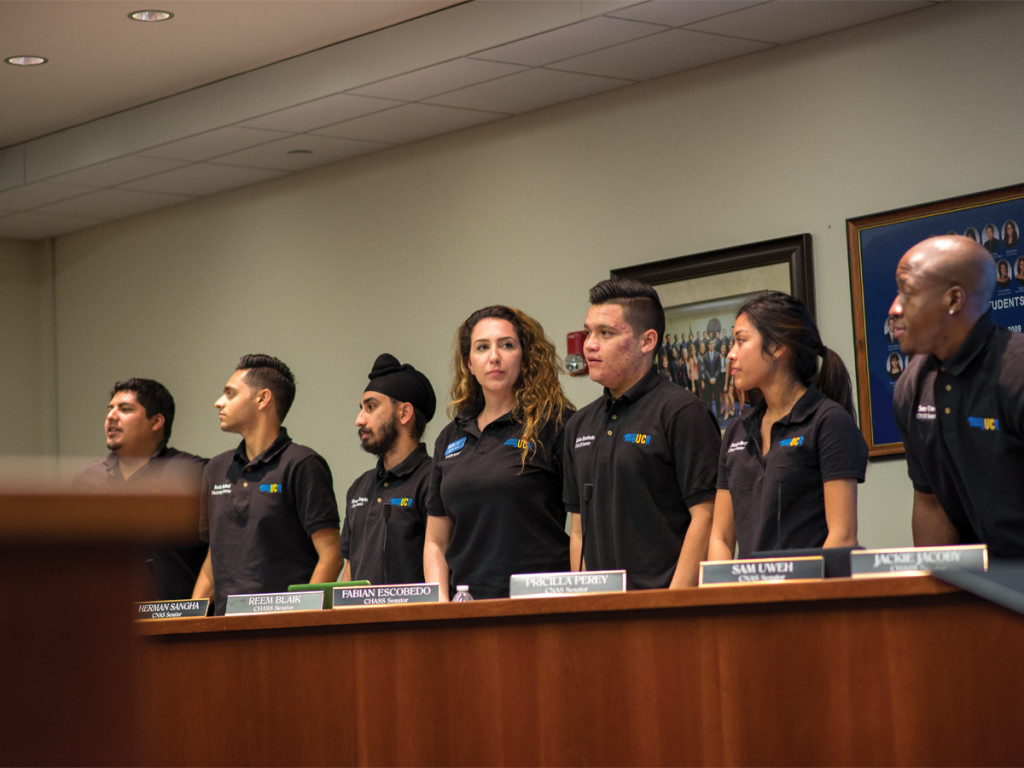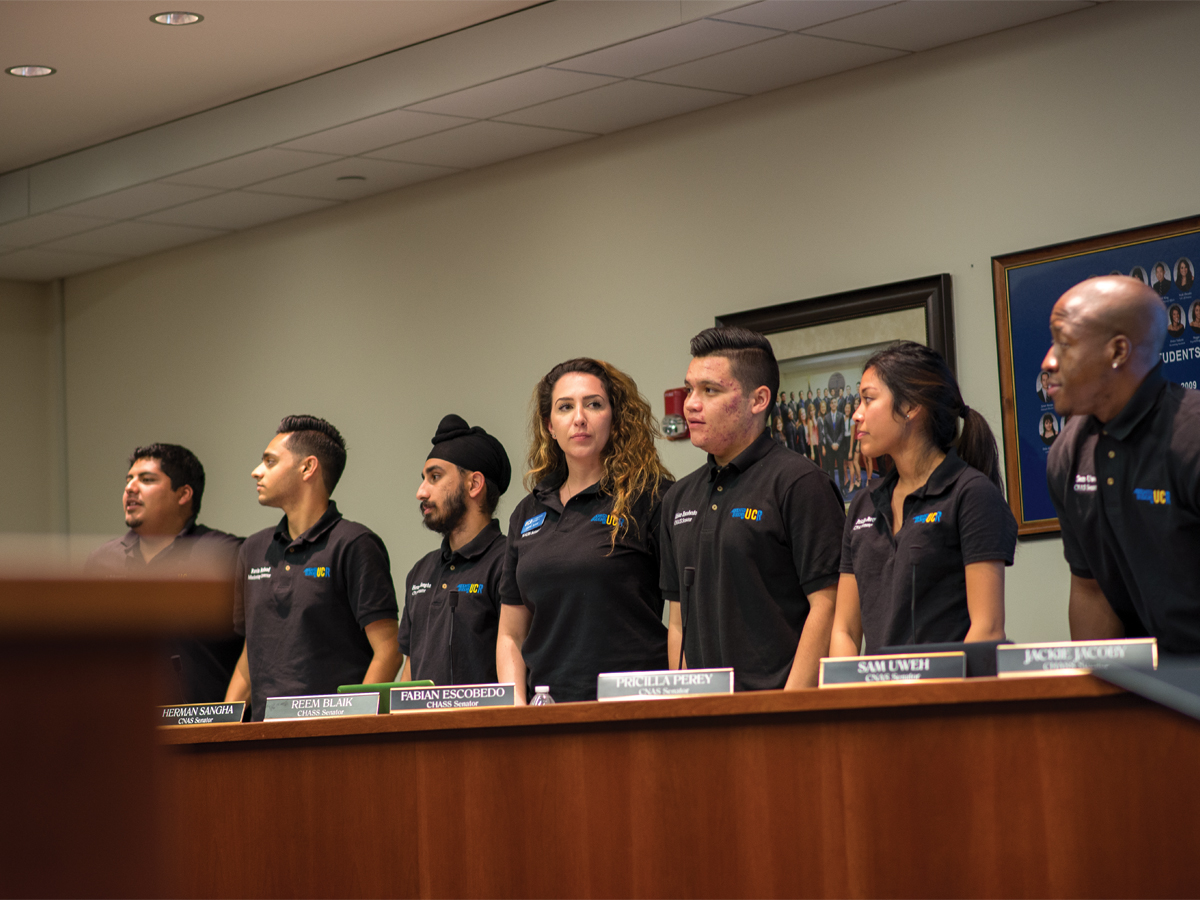
Last Wednesday, members of ASUCR passed a resolution calling for the UCR administration to warn students via email before triggering or offensive demonstrations occur on campus and condemned the proposed tuition plan that the UC Board of Regents will vote on during their next meeting on Nov. 19.
Various organizations have continually expressed disapproval of the demonstrations organized by pro-life organizations such as Students for Life, which has invited pro-life groups on campus in the past. Because of the potentially offensive and triggering nature of such displays, Senator Summer Shafer introduced a resolution which calls for emails to be sent to the entire student body “warning them that Students for Life, or any other organization that fosters a similar environment, such as the Center for Bioethical Reform, will be present.”
The resolution described the Students for Life display occurring on Nov. 6 as “emotionally triggering” and “not conducive to a positive academic environment.” President Pro Tempore Devin Plazo expressed her approval of the resolution, stating that, “We’re not asking these groups to not come on campus … we’re just asking that a warning be sent out.”
The resolution calls for the UCR administration to send out the trigger warning emails, but Vice President of Internal Affairs Fernando Echeverria will take on the task until then.
Vice Chancellor of Student Affairs Jim Sandoval was apprehensive about the unintended message the resolution might send. He stated that, “The university is always very careful to refrain from communications related to any expressions of speech on campus.” He noted his desire that the language of the email “be as neutral as possible … and not (make) a commentary on the content (of the demonstrations),” citing the University’s devotion to the first amendment. However, in response to the resolution passing, he promised that administration would “do (their) best to get a letter out to the student body.”
The campuswide email that was sent on Nov. 6 by ASUCR in accordance with the resolution warned of “pictures and language pertaining to sexual violence and abortion that could be triggering,” and listed resources for students who are negatively affected by the displays. The resolution was passed unanimously with a standing vote, in which each senator stood up and publicly cast their ballot.
Also discussed at the meeting was the UC regents’ five-year plan to stabilize tuition and fees. Three years of consecutive tuition freezes — which began in 2011-12 — may come to an end on Nov. 19, if the UC regents continue plans to increase tuition by no more than 5 percent. This depends on the state and its ability to continue offering an expected 4 percent increase to the UC and support for the Cal Grant program.
The plan emphasizes that “tuition and fee increases could be lower — or eliminated — if the state provides additional funds above UC’s base budget adjustment.” However, if these conditions are not met, the plan calls for a tuition increase of no more than 5 percent, raising tuition from $12,192 for in-state students to $12,804, and the student services fee by $48 from UCR’s current $324 quarterly fee for 2015-16 through the 2019-2020 school year. The 5 percent will be redetermined every year and may decrease if additional state funding is allocated to the UC over the course of the next five years.
Vice President of External Affairs Abraham Galvan referred to the plan as “hostage taking,” and said that “UCOP is putting a gun to the head of the UC student body and extorting the governor and legislature for more funding.”
The plan promises to increase enrollment by at least 5,000 California students, boost graduation rates, provide more courses, improve the student-faculty ratio and maintain the UC’s current financial aid — all in the next five years.
The plan has been met with opposition, notably in the form of a petition begun on Oct. 30 by the UC Students Association. The petition states that students “have the right to seek long-term, sustainable funding sources that take the burden off students, and not only freeze tuition, but roll back tuition.”
Galvan urged ASUCR to take action, saying, “This petition will not be enough. It will take a lot more action from us to prevent something like this from happening.”
Highlights:
Arturo Gomez was approved as national affairs officer within the external affairs office by a 15-0 vote.
Senator Colette King is launching a new “Sketch Series” of short videos to inform students of issues in an entertaining way. The first video is called “Vote” and encourages young registered voters to vote. The name of the series will most likely be changed.
There will be a ribbon-cutting for a new solar farm on Thursday, Nov. 13 at noon at the UCR community garden near Lot 30. The farm will include 7,440 panels and will produce up to 6.6 million megawatt hours of electricity per year.
There is a new internship program through the office of external affairs with opportunities for students to work with the Riverside Chamber of Commerce. Students can contact Galvan for more information.
ASUCR is looking for student organizations and volunteers to help plant over 400 trees. The remaining planting days are Tuesday, Nov. 18 from 12 p.m. – 2 p.m. and Thursday, Dec. 4 from 1 p.m. – 3 p.m.
The senate reaffirmed November as transfer awareness and recognition month.








